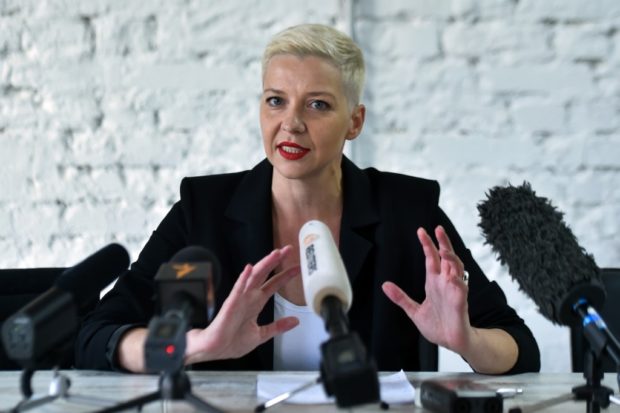
(FILES) In this file photo taken on August 11, 2020 Maria Kolesnikova, an ally of Svetlana Tikhanovskaya, holds a press conference in Minsk. Unidentified men in black on September 7, 2020 morning grabbed Maria Kolesnikova, a leading Belarusian opposition figure, and pushed her into a minibus, her campaign team reported, citing witnesses. Photo by Sergei GAPON / AFP
MINSK, Belarus — The European Union on Monday led calls for Belarus to immediately release over 600 people arrested for protesting against a controversial election that extended strongman Alexander Lukashenko’s 26 years in power.
Germany and Britain meanwhile demanded answers on the whereabouts of senior opposition figure Maria Kolesnikova, who allies say was snatched off the streets in central Minsk along with a spokesman and executive secretary of the Coordination Council.
The Council was set up to ensure a peaceful transfer of power after Lukashenko’s main rival Svetlana Tikhanovskaya rejected Lukashenko’s claim to have won the August 9 presidential election with 80 percent of the vote.
The interior ministry said 633 people were detained on Sunday for illegal mass gatherings, one of the largest wave of arrests since the early days of the demonstrations.
“The EU expects the Belarusian authorities to ensure the immediate release of all detained on political grounds before and after the falsified 9 August presidential elections,” its diplomatic head Josep Borrell said.
“The EU will impose sanctions on individuals responsible for violence, repression and falsification of election results,” he added.
Voicing concern over the fate of Kolesnikova, Germany’s Foreign Minister Heiko Maas demanded “clarity on the whereabouts and the release of all political prisoners in Belarus.”
Britain’s foreign secretary Dominic Raab added: “Seriously concerned for the welfare of Maria Kolesnikova in #Belarus. Lukashenko’s regime must make her safe return their highest priority. The regime must cease brutalizing protestors, release political prisoners and begin dialogue with the opposition.”
Canada’s foreign minister Francois-Philippe Champagne called “for the release of people detained including opposition members and journalists.
“The most recent arbitrary arrests of leading opposition voices and acts of repression are unacceptable,” he said.
Tikhanovskaya left the country under pressure from the authorities and was granted refuge in EU member Lithuania.
‘Don’t know where Maria is’
“The more they try to scare us, the more people will take to the streets,” Tikhanovskaya said in a statement.
The disputed election has sparked demonstrations that have seen tens of thousands take to the streets of the ex-Soviet country of 9.5 million on Russia’s western borders, in an unprecedented challenge to Lukashenko’s 26 years in power.
An AFP journalist said the crowd of demonstrators waving the opposition’s red-and-white flag on Sunday appeared to be as large or larger than on the previous three Sundays, when more than 100,000 people rallied in the streets of Minsk.
But police also appeared to be stepping up a campaign to quash the demonstrations, deploying troops, water cannon and armored vehicles.
Local media reported hooded men in civilian clothes with batons chased and beat demonstrators.
Kolesnikova’s office said witnesses described her being snatched off the street in the capital Minsk on Monday morning by unidentified men in black who bundled her into a minibus marked “Communications.”
“We still don’t know where Maria is and what is happening to her,” said lawyer Maxim Znak, a member of the Coordination Council, in a video blog on Monday evening.
Trio of women campaigners
The Coordination Council said its press secretary Anton Rodnenkov and executive secretary Ivan Kravtsov had also disappeared, while police said they had no information on detentions.
Belarusian authorities had already detained several members of the Coordination Council and others have left the country under official pressure. One, Olga Kovalkova, said on Saturday she was in Poland after security services threatened her and took her to the border.
Kolesnikova and other members including Nobel Literature Prize winner Svetlana Alexievich have faced questioning in a probe over an alleged bid to seize power.
Kolesnikova, 38, is the only one of the trio of women who fronted Tikhanovskaya’s campaign to remain in Belarus.
Tikhanovskaya’s other campaign partner, Veronika Tsepkalo, is now in Ukraine.
Kolesnikova, a trained flautist and music teacher, entered politics to run the campaign of another opposition politician, ex-banker Viktor Babaryko, who attempted to stand for president against Lukashenko but was jailed and barred from running.